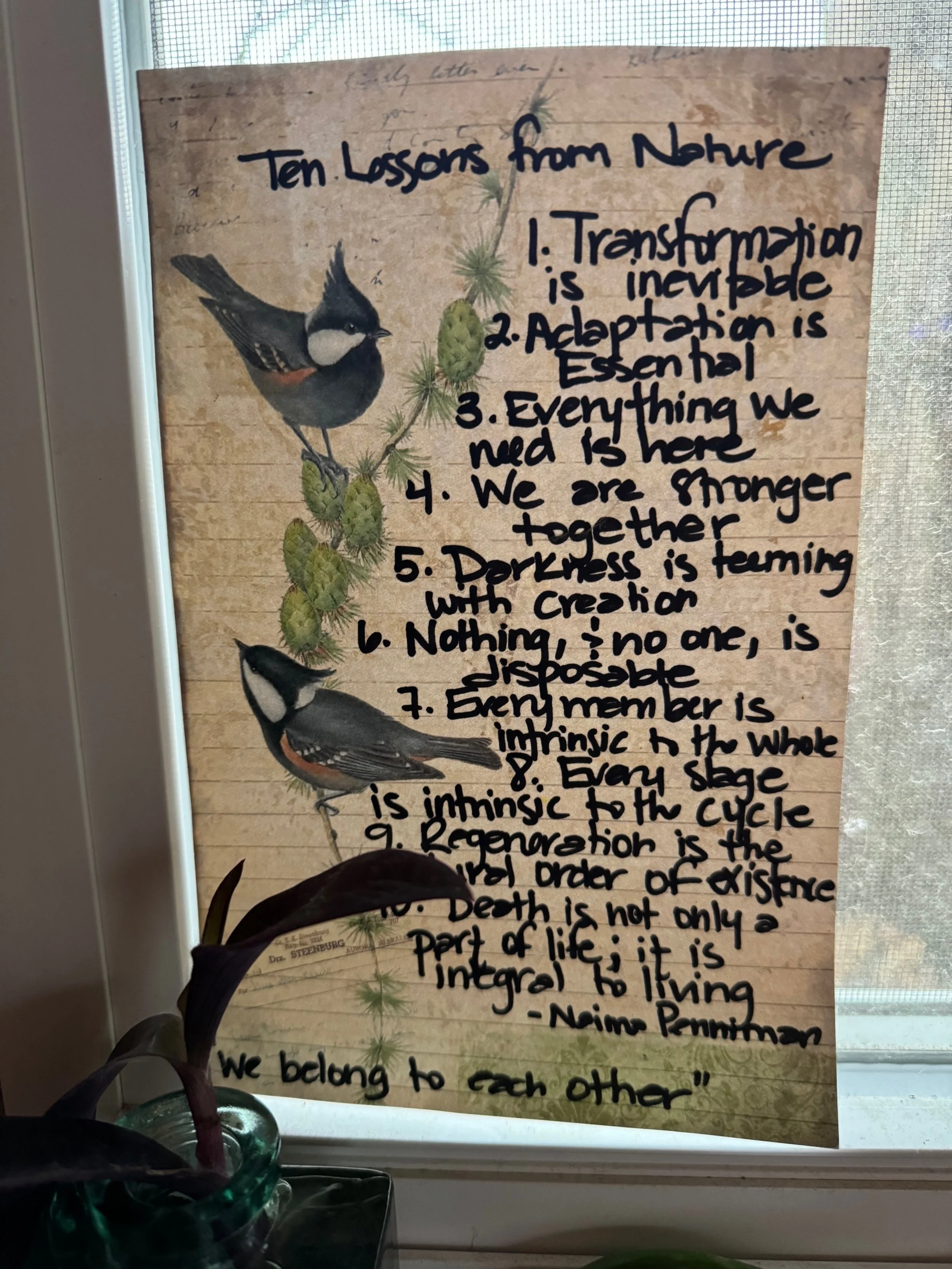Bird Breaks and the Path to Community Care
A murmuration of Starlings landing in trees to rest for the night outside of Iowa City, IA in December 2017. Photo by author.
Before I knew there was a world of birding—a community and language and wonder of its own—birds were one of my most beloved coping tools, a way to stay grounded in the present when so much in life felt overwhelming. Birding wasn’t just a pastime for me; it was often a life raft. Complex PTSD and depression had routinely left me grasping for ways to connect with myself and the world around me in my teens, twenties, and into my thirties and beyond, often in moments when words, therapy, or even rest couldn’t reach me. Then later as my journey with physical limitations, mobility challenges, and chronic health conditions evolved, the world of birds offered me a steady rhythm, a mindful practice of observing and grounding that has not only sustained me but has become central to my commitment to liberation and justice.
In my life, especially in the work of disability justice, liberation, and community care, staying grounded is an essential tool to be able to do the work of systemic change every day. Birding has been such a grounding force. A deep stillness is required to observe birds, a quiet patience that slows everything down and makes space for mindful presence. In those pauses, I find strength and reason, both, to continue the work to challenge systems that marginalize, to reimagine access, and to uplift people with disabilities, including myself. My queer identity, my love of community, my understanding of the hard work ahead of us, and my commitment to continue this work for social justice are nourished in those moments of deep quiet and attentiveness.
I’m grateful that my wife and partner understand this need, this powerful medicine of connection with birds. Bird breaks, as we’ve come to call them in my household, are no longer just interruptions; they’re moments of presence that allow us to be in tune with the world. It’s not uncommon for me (and now us) to stop mid-sentence, mid-walk, or mid-drive, to simply watch and listen—to witness and participate in the natural world that gives so much and asks so little in return. It has become a shared language, a way of honoring the natural cycles we’re all part of, and a powerful reminder of why this work is so important - everyone deserves (and needs) access to, and a deep relationship with, nature.
A murmuration of Starlings over a field. Image courtesy of James Wainscoat via Unsplash.
In her book Emergent Strategy, adrienne maree brown writes about working with the patterns of the natural world to guide social transformation. Her thinking has long been a guide to me and her use of murmurations of starlings as a model for how we must be in community as we learn to move nimbly with each other resonates across many movements. These teachings are beautifully echoed in Naima Penniman’s words from her essay in A Darker Wilderness, where she reflects on the wisdom of nature as a template for our collective preservation:
"There are no ten simple fixes for saving the Earth. But there are prerequisites for our collective preservation. We are called to shape the future now. At this crossroads of peril and promise, the natural world is our beacon and compass. Our ecosystems offer templates for resource sharing and prototypes of pollination. The forest gives us archetypes of interdependence and frameworks for evolution. Instead of ten prescriptions for protecting the planet, I will offer up ten lessons our devoted babysitter Mama Nature taught us—handwritten and sealed with love. May we apply them on the path ahead."
A handwritten list hanging in the author’s kitchen window with Naima Penniman’s Ten Lessons from Nature.
The text reads:
Ten Lessons from Nature
Transformation is inevitable.
Adaptation is essential.
Everything we need is here.
We are stronger together.
Darkness is teeming with creation.
Nothing, no one, is disposable.
Every member is intrinsic to the whole.
Every stage is intrinsic to the cycle.
Regeneration is the natural order of existence.
Death is not only a part of life; it is integral to living.
— Naima Penniman
At the bottom, it says, "We belong to each other."
Birds offer lessons in interdependence, presence, and evolution if only we listen. They show us that we, too, are part of these ecosystems—connected, resilient, and worthy of care. The work of Birdability and for disability justice is grounded in this understanding: that liberation requires that we care for one another, that we shape a future where everyone, regardless of physical or mental ability, has a place to rest, to heal, and to thrive. Birding offers that space for me and many others.
In this chaotic and often unyielding world, I return to birds as a model of resilience, and as teachers in grounding and quiet. This practice of mindful birding is not just about observing; it’s about being in relationship with self, in reciprocity with the natural world, and ultimately, with one another. About being deeply present and connected across eons. It is through these pauses, these bird breaks, that I find the clarity and joy to continue making “good trouble” as John Lewis calls it, knowing that our work, like nature, is patient, ongoing, and profoundly interconnected. May we continue to learn from nature, from each other, from the Indigenous people who have stewarded these lands, and from the birds who consistently offer a way of understanding the web of connection. I hope that we can apply these lessons on our path toward liberation and justice—for ourselves, our communities, and the world.



